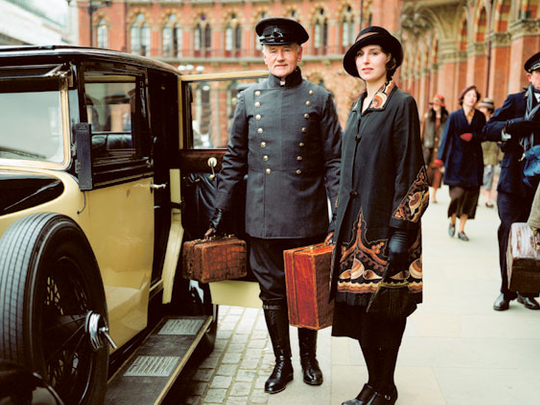
It is Downton Abbey’s biggest cliffhanger, but for once, it does not involve any of its long litany of characters.
Instead, it concerns the future of the programme itself. Julian Fellowes, the creator of Downton, last week dropped his greatest hint yet that the next series of the ITV1 drama will be its last.
In an interview, the screenwriter admitted there was no way he could continue to write the show’s storylines at the same time as working on his next major project — to create what has been described as an American version of the series.
The Gilded Age, to be set in New York in the late 19th century, has been commissioned by the US network, NBC Universal, but its production is being held up by Fellowes’s continuing commitment to Downton, which is due to return for a fifth series later this year. Fellowes, however, who was elevated to the peerage in 2011, has now indicated that this series could be the last. He dropped his bombshell during an interview in the US, last week.
Asked about The Gilded Age, he said: “It will happen when Downton finishes, because I just couldn’t do both at once.”
When pressed on whether this meant there would still be a fifth series of Downton, he added: “Yes. I don’t know yet if there is a season six, but it’s not going to go on forever. It won’t be Perry Mason.” Fellowes has combined his Downton duties with writing a second period drama in the past. However, the resulting series, Titanic, in 2012, was received with markedly less favour than the ongoing saga of the Crawley family.
News of Downton Abbey’s possible demise will alarm fans of the show, as well as managers at ITV, where it has been one of the channel’s biggest successes of recent years, coping with the loss of some of its leading characters as actors have departed, among them Dan Stevens, who played Matthew Crawley, and Jessica Brown Findlay, who played Lady Sybil.
The most recent series, which ended in the autumn, had average viewing figures of 11.8 million, and the Christmas Day special was watched by about seven million.
Since its beginning in 2010, the show has been sold in more than 220 territories worldwide and has been a notable success in the US, becoming the highest-rated drama series in the history of its broadcaster, PBS.
Its popularity there has led to heightened interest in The Gilded Age project, and it emerged last February that Fellowes had signed up to write and produce the drama. The new series takes its name from the period of US history from the 1870s to the turn of the 20th century, an era of great social and technological change, as well as rapid economic growth, especially in the north and west of the country.
The term was coined by Mark Twain and Charles Dudley Warner in an 1873 novel they wrote to satirise what they saw as the greed and corruption of the time. Fellowes’s project will explore the rise of newly rich families who emerged during the period — some of whom became known as “robber barons” — and replaced the older, established aristocracy. As with the British series, the main characters will be fictional. It had been suggested that Fellowes could hand over the main Downton Abbey writing responsibilities to others, to allow him to concentrate on US show.
But his latest comments, in The Wall Street Journal, have made clear he does not see that as an option. Fellowes writes the scripts for Downton alone, although he said in the US interview that he bounces ideas off his wife. “She gets to read [the scripts] first. It only goes off to my agent after it’s been through her,” he said.
The last series caused controversy over a storyline in which Anna, the housemaid played by Joanna Froggatt, was raped by a guest’s valet. ITV received 200 complaints after the episode on October 6, while Ofcom, the media watchdog, received 250. Ofcom decided not to pursue the complaints “after careful assessment because they did not raise issues warranting investigation”.












